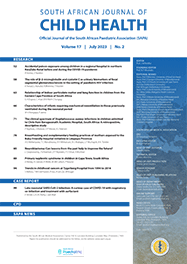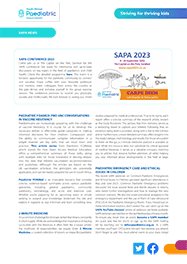Research

Unsafe disposal of faeces and its correlates among children under three years in Eswatini
Abstract
Background. It has long been established that human excreta contain over 50 pathogens that are transmitted via the faecal route, yet the common practice of unsafe disposal of children’s faeces still persists in developing countries.
Objective. To identify the factors associated with unsafe disposal of children’s faeces among children under three years of age in Eswatini.
Methods. The study was based on combined data for the 2010 and 2014 Eswatini Multiple Indicator Cluster Surveys, from which 2 765 children aged less than three years were included in the analysis. The analysis was based on logistic regression using weighted survey data.
Results. Overall, 41.8% of the childrens’ faeces were disposed of unsafely. In the final multivariable logistic regression analysis, the odds of unsafe disposal of children’s faeces were lower for households whose children were aged 12 months and older, compared with households whose children were under six months. Households with a pit latrine were less likely to dispose of child faeces unsafely, while the practice of unsafe disposal of children’s faeces was more common in households with no toilet facility compared with those from households with a flush toilet. The practice of unsafe disposal of children’s faeces was more common in urban areas than in rural areas. Regionally, lower odds of unsafe disposal of children’s faeces were observed among households from the Manzini and Shiselweni regions, compared with those from the Lubombo region.
Conclusion. The study demonstrated that child age, toilet facilities, place of residence, and region of residence were associated with unsafe disposal of children’s faeces.
Authors' affiliations
M S Simelane, Department of Statistics and Demography, Faculty of Social Sciences, University of Eswatini, Kwaluseni, Eswatini
G B Chemhaka, Department of Statistics and Demography, Faculty of Social Sciences, University of Eswatini, Kwaluseni, Eswatini
T Maphosa, Elizabeth Glaser Pediatric AIDS Foundation, Washington, United States of America
E Zwane, Department of Statistics and Demography, Faculty of Social Sciences, University of Eswatini, Kwaluseni, Eswatini
Full Text
Cite this article
Article History
Date published: 2020-12-14
Article Views
Full text views: 754

.jpg)



Comments on this article
*Read our policy for posting comments here